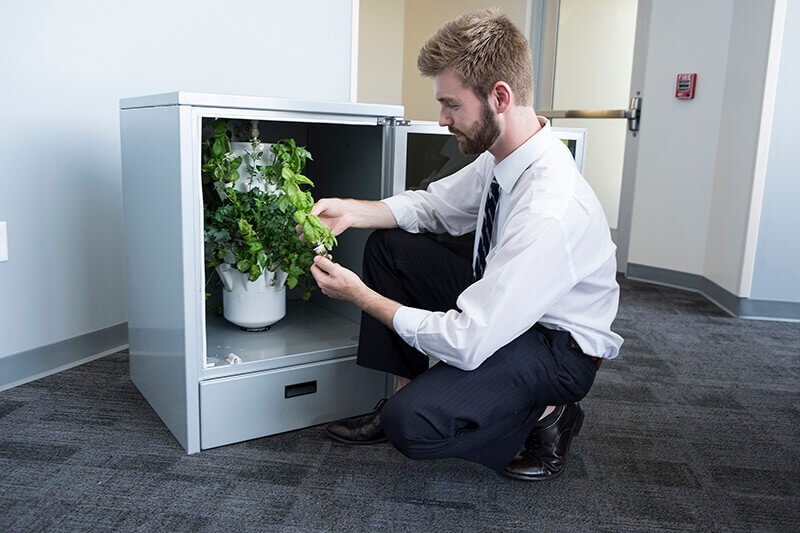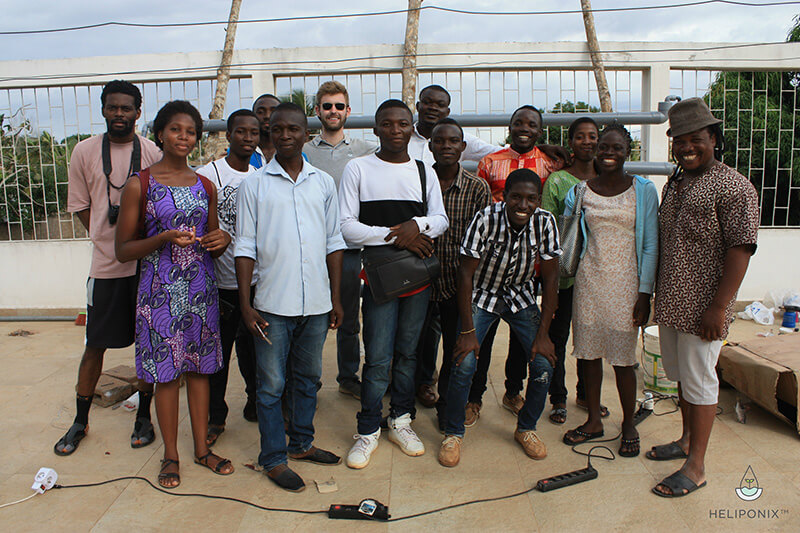September 6, 2018
5 years, 60 startups: Purdue students own their inventions, thriving under university’s policy
 Scott Massey, Heliponix LLC chief executive officer, examines the development of plants growing in a GroPod, a dishwasher-sized appliance that fits under a kitchen counter and grows produce year-round. Heliponix was among five companies selected to receive $80,000 investments from the Elevate Purdue Foundry Fund. (Chris Adam/Purdue Research Foundation Image)
Download image
Scott Massey, Heliponix LLC chief executive officer, examines the development of plants growing in a GroPod, a dishwasher-sized appliance that fits under a kitchen counter and grows produce year-round. Heliponix was among five companies selected to receive $80,000 investments from the Elevate Purdue Foundry Fund. (Chris Adam/Purdue Research Foundation Image)
Download image
WEST LAFAYETTE, Ind. – From frozen yogurt to musical backtracks to social apps and even hydroponic in-home greenhouses, Purdue University students are taking advantage of Purdue’s policy giving them ownership when they, as students, create an invention, generating a flurry of startups that advance the lives of others.
Scott Massey and Ivan Ball, 2017 graduates of Purdue’s Polytechnic Institute and founders of Heliponix LLC, say the reassessment in Purdue intellectual property rights that gives students ownership of their inventions motivated them to found their startup.
“We definitely took the leap to found our startup because we liked the idea of owning our own technology, and it has been an unbelievable experience both in learning and contributing to society,” Massey said. “Being able to take our knowledge and technology to West Africa is something I will never forget. I also would never have believed that I would be a co-founder of a startup that is doing so well. A lot of credit goes to the Purdue Foundry and Purdue University for the strong support system they provide for student entrepreneurs. We’ve just learned so much.”
Heliponix’s technology, called the Gropod™ is a refrigerator-sized aeroponic appliance capable of growing fresh produce in a consumer’s home. While in the West African country of Togo, Massey co-led a workshop on hydroponic systems to help participants develop sustainable agriculture methods in an undeveloped environment.
 Scott Massey (center, with sunglasses), a founder of Heliponix LLC, poses with residents of Togo who took part in a hands-on workshop on hydroponics in the small West Africa country, where many people survive on subsistence farming. The workshop was funded by the Mandela Washington Fellowship Reciprocal Exchange Component. (Photo provided by Heliponix)
Download image
Scott Massey (center, with sunglasses), a founder of Heliponix LLC, poses with residents of Togo who took part in a hands-on workshop on hydroponics in the small West Africa country, where many people survive on subsistence farming. The workshop was funded by the Mandela Washington Fellowship Reciprocal Exchange Component. (Photo provided by Heliponix)
Download image
Heliponix is one of about 60 student-driven startups that launched since Purdue University announced five years ago that students could own their own intellectual property. The student startups also have generated more than $2.5 million in venture funding, business plan competitions and startup grants.
Mimir, a software company committed to growing the software engineering workforce, is one of the first student startups to work with the Purdue Foundry to research and obtain intellectual property ownership.
Shortly after Mimir was founded, the team worked in the Anvil, a Purdue student incubator, while also receiving assistance from the Purdue Foundry. In 2015, Mimir's co-founders were accepted into Silicon Valley-based Y Combinator, an investment group that aids promising startups to shape their ideas and prepare them for larger fundraising. After spending the summer in Silicon Valley for the program, the co-founders returned to Indiana.
“During our time at the Anvil we were actively planning for the future of Mimir,” said Prahasith Veluvolu, CEO of Mimir. “With help from partners like the Foundry, we learned how to legally possess our intellectual property so that we could shift our focus toward enhancing our product in an effort to better support our customers.”
The company has been nationally recognized for Mimir Classroom, its flagship product, and in 2017 Forbes chose co-founders Colton Voege, Jacobi Petrucciani and Veluvolu for its annual “30 Under 30” list of exceptional innovators under the age of 30. All three are former computer science students in Purdue’s College of Science.
Mimir Classroom continues to help computer science instructors with the delivery of their curriculum at more than 70 universities. Earlier this year, in an effort to further the company's mission, Mimir Workforce was created. This technical assessment tool helps hiring managers and recruiters evaluate and hire software engineers for internal roles.
Representatives from Mimir are currently attending the TechCrunch Disrupt SF Conference in San Francisco.
The strategic goal of fostering a culture of entrepreneurship for students was paramount in the modification in students’ intellectual property ownership.
 Mimir co-founders, from left, Colton Voege, Jacobi Petrucciani and Prahasith Veluvolu. (Photo provided by Mimir)
Download image
Mimir co-founders, from left, Colton Voege, Jacobi Petrucciani and Prahasith Veluvolu. (Photo provided by Mimir)
Download image
“We set out to build the nation’s best ecosystem for innovation and entrepreneurship, and granting our undergraduates the control of intellectual property seemed like a positive cultural signal,” Purdue President Mitch Daniels said. “It’s turned out to be far more than symbolic, as 60 startup companies demonstrate. At Purdue, we believe you’re never too young to start a business.”
The Purdue Foundry, created in 2013, offers entrepreneurial assistance and startup funding to students, faculty and staff. Services include office mentoring, funding, educational opportunities, networking, marketing and business competitions.
“Our core value is ideas to impact, and whether a technology is owned by a student or one that is licensed through Purdue's Office of Technology Commercialization we offer the same high level of entrepreneurial assistance,” said Greg Deason, senior vice president for entrepreneurship and placemaking at the Purdue Research Foundation. “Many of the students creating startups are also creating a career path for their futures.”
The Purdue intellectual property guidelines offer students clear ownership rights as long as the resources used were part of a course and were available to all students in the course; that the student was not paid by the university or a third party; and the class or project was not supported by a corporation or government grant or contract.
In 2013, the Anvil was established with support by the Purdue Research Foundation and managed by Purdue students to provide an incubator for student startups.
“The Anvil now has 157 members,” said Juliana Casavan, entrepreneurial program manager, who provides guidance and entrepreneurial programming for the Anvil. “Since the Anvil was founded it has become a hub of entrepreneurial activities for students who have the motivation and desire to create a startup.”
The increase in technology transfer activities and startup creation aligns with Purdue's “Giant Leaps” Ideas Festival celebrating the university’s global advancements made in health, space, artificial intelligence and sustainability as part of Purdue’s 150th anniversary.
About Mimir
Mimir is software company that grows the software engineering workforce. The company's core product, Mimir Classroom, helps computer science instructors scale and automate curriculum without compromising quality for students. Mimir Workforce, was a supplemental product built to house a technical assessment tool for evaluating and hiring engineers. For more information about Mimir, call 317-449-3517 or visit www.mimirhq.com.
About The Anvil
The Anvil is a Purdue University student-managed startup incubator that assists students with 24/7 office space with Internet access, networking opportunities and conference rooms. The Anvil receives funding from the Purdue Research Foundation and other sources.
About Purdue Foundry
The Purdue Foundry is an entrepreneurship and commercialization accelerator in Discovery Park's Burton D. Morgan Center for Entrepreneurship whose professionals help Purdue innovators create startups. Managed by the Purdue Research Foundation, the Purdue Foundry was co-named a top recipient at the 2016 Innovation and Economic Prosperity Universities Designation and Awards Program by the Association of Public and Land-grant Universities for its work in entrepreneurship. For more information about funding and investment opportunities in startups based on a Purdue innovation, contact the Purdue Foundry at foundry@prf.org.
Writer: Cynthia Sequin, 765-588-3340. casequin@prf.org
Sources: Mitch Daniels, president@purdue.edu
Prahasith Veluvolu, 317-449-3517, prahasith@mimirhq.com
Scott Massey, scott@heliponix.com
Greg Deason, gwdeason@prf.org
Juliana Casavan, jbcasavan@prf.org
